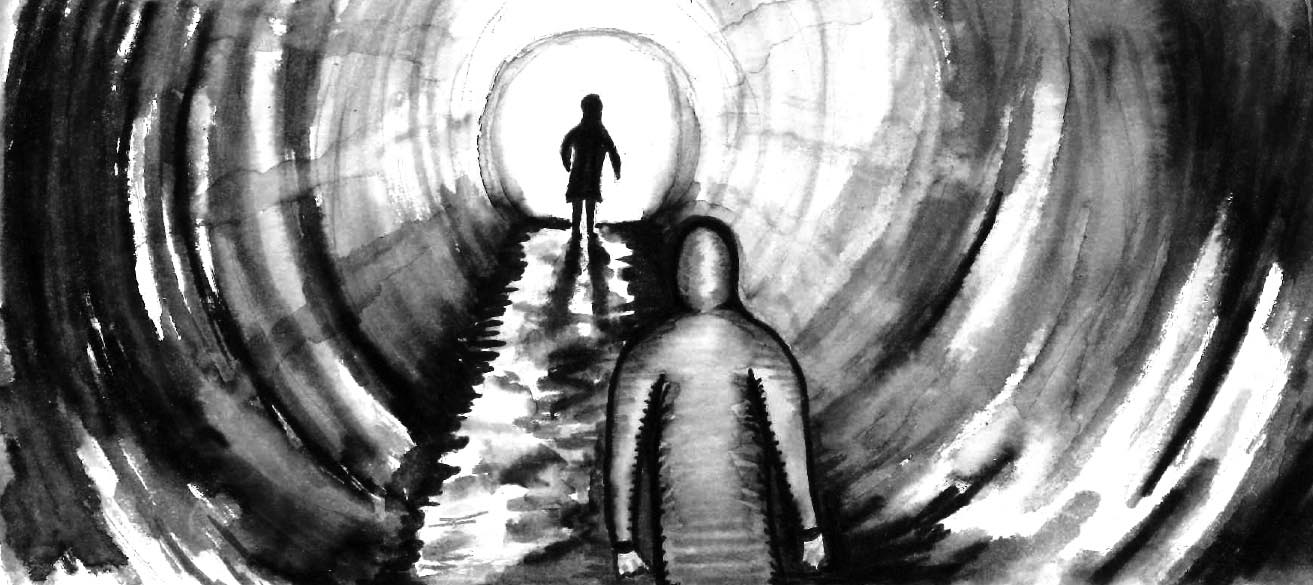I’m walking back to my car at 2:00 a.m. after a longer-than-usual night in the library. There’s a woman, about my age, walking slightly ahead of me through the quad. She looks back, looks forward, does a few more quick takes back at me, and walks a little faster. Now I’m nervous; I look around to see what she’s scared of. I don’t see anything, I’m the only other person around, I’m not sure what or who—
Oh right. I’m what’s making her nervous. I’ve forgotten in that moment that I’m a six-foot tall man wearing a black sweatshirt, that the quad is dark, that she doesn’t know me at all, that — as comedian John Mulaney said recounting a similar experience — “in her eyes, I’m an adult. And adults rape each other — kind of a lot.”
I listen to Broadway cast albums on my way to class, and I have a paralyzing fear of moths, but at night, women are scared of me. Because of my height and gender, women I don’t know frequently worry that I could be a threat to them. And that’s infuriating. Not because of the assumption itself — going off sexual assault statistics alone, I would profile me too — but because violence against women is such a rampant problem in the U.S. (and, of course, the world), that women are rightfully on guard.
Men need to join the conversation about sexual assault — and not just out of basic civic and moral decency. But because rape culture is men’s problem too — and even if it gives them a leg up in the professional world, it does its best to ruin them as people, to the detriment of women and themselves.
The U.S. encourages rape culture under the premise that “boys will be boys.” This is more than a hackneyed mantra for tired parents. It’s a mentality, one that allowed Brock Turner to serve only three months in jail after being caught in the act of raping someone behind a dumpster; one that let Bill O’Reilly stay on the air through sexual harassment lawsuits, only cancelling his show when he started losing Fox money; one that helped elect Donald Trump president even after he was caught on tape bragging about sexual assault.
The “boys will be boys” defense frames violence against women as simply an unfortunate characteristic of the male gender. Biology is to blame. Men are so high in testosterone — the male hormone synonymous with belligerence — that they can’t help but be aggressive.
But research shows this isn’t true. Though testosterone does magnify aggressive behavior, it’s rarely the root cause. According to The Scientific American, most violent prisoners — male or female — have higher level of testosterone than less violent inmates, so while testosterone may exacerbate violent behavior, it’s not its direct cause.
So why do we keep treating this kind of aggressive behavior as unavoidable? And more importantly, why aren’t more men offended by it? I certainly don’t feel like a predator when I cower from a moth on my windowsill (or ever, but you get the point), and the thought of being seen as one frustrates me when I think about the women in my life that I care about.
“Boys will be boys” dismisses the experiences of sexual assault survivors; denies them the justice and clarity of being wronged. The language of “boys will be boys” acknowledges that boys — and men — are humans, so why do we use this phrase as justification for inhumane behavior? Being a “boy,” as opposed to an animal, means having the empathy, restraint and respect to see a woman in a mini-skirt and not rape her. Setting the bar any lower than this dehumanizes men. If we want society to hold us to higher standards, we must first do so ourselves.
Of course, “boys will be boys” logic does make sense if we were actually talking about animals. If I went hiking in the mountains, came across a grizzly bear, didn’t take the proper precautions and ended up getting mauled, I would deserve at least some of the blame. Sure, the bear is what actually attacked me, but it was on me to know how to safely extricate myself from that situation, since I can’t reasonably expect a grizzly bear — a dangerous, vicious, wild animal — to know the difference between right and wrong.
But men aren’t grizzly bears. When society allows boys to act like animals, boys continue to behave like animals. And that breeds damaged men. Dr. Elizabeth Meyer of the University of Colorado, Boulder’s education department has written that when teachers and parents allow “boys to be boys,” young men are more likely to construct gender stereotypes, further unconscious gender-related biases, limit their means of emotional expression and prevent them from dealing with their psychological issues.
Down the road, this breeds unhealthiness, unhappiness and violence. Most mass shooters are men. Most violent crime is committed by men. Most suicide is committed by men.
From an early age, we need to teach boys that the world is not simply theirs for the taking, that they are accountable for their actions, that they can better themselves, that there is no excuse for not treating women with respect. We need to do this for women, but also for men.
Greg Feiner is a junior Politics major. He can be reached at feiner@oxy.edu
![]()































